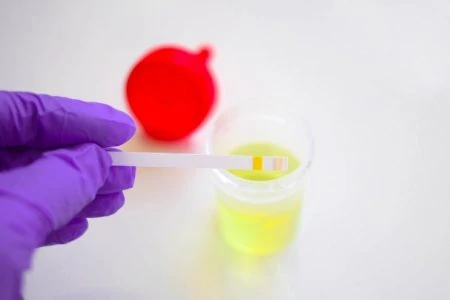If you’re pregnant, you’re probably familiar with the prenatal appointment drill: You check in at the front counter, get called back by the nurse, and make a quick stop at the ladies’ room on your way to the exam room.
But have you ever wondered why they take a urine sample at every doctor’s visit throughout your pregnancy?
One of the reasons is checking for protein in your urine, which could indicate a number of serious conditions that could impact you and your baby. Here’s what you need to know about what they’re looking for, and what it means if you have protein in your urine during pregnancy.
Key Takeaways
- Urine samples are taken to check for protein, sugars, ketones, or bacteria which could indicate a number of serious conditions that could impact you and your baby.
- Prenatal urine tests are primarily used as a screening tool, not for diagnosis.
- Protein in urine is normal in low levels, but if the amount of protein in your urine rises above a certain threshold, your doctor may become concerned.
- Elevated protein levels in urine can be caused by temporary conditions such as dehydration, emotional stress, exposure to extreme cold, fever, vigorous exercise, or by an ongoing medical issue that may need treatment.
- Consult with your doctor if you are concerned and express any concerns you may have.
Why Do I Have to Give a Urine Sample at My Doctor’s Visit?
Every woman’s body responds differently to pregnancy, but it’s not practical to run a full gamut of tests at every visit to detect every disease. However, doctors can easily test for indicators of some of the most common pregnancy-related afflictions, and one of the ways they do that is by checking your urine for unexpected byproducts.
Some of the things they’re looking for when checking your urine are protein, sugars, ketones, or bacteria (1). Each of these things could indicate you may be developing certain medical conditions, such as a urinary tract infection, diabetes, and preeclampsia, that need special monitoring or treatment.
Keep In Mind
How Often Will They Check My Urine for Protein?
Some health care practitioners will check your urine at every visit by dipping a chemical strip into your sample to give them an instant indication of whether there is protein in your urine. Others will check your urine less frequently at the beginning of your pregnancy and monitor it more closely toward the end.
You will be asked to give a urine sample in a sterile cup. Make sure to use sterile wipes to wipe front to back before urinating to prevent contamination with any bacteria and to get more accurate results. Another helpful tip that increases accuracy is to first release some urine and start to collect it in the sterile cup midstream. This process will be especially difficult in your third trimester, so make sure to take your time!
Your doctor may also send the sample off to a lab for a more thorough evaluation than the instant test strips provide.
If You’re Worried
Is Protein in My Urine Normal During Pregnancy?
Low levels of protein in your urine are normal (2). But if the amount of protein in your urine rises above a certain threshold, your doctor may become concerned.
However, some conditions can cause a temporary, harmless rise in your urine protein, including:
- Dehydration.
- Emotional stress.
- Exposure to extreme cold.
- Fever.
- Vigorous exercise.
Other risk factors include obesity, family history of kidney disease or high blood pressure, older age, and ethnicity.
If your doctor detects elevated protein levels in your urine, they will conduct further testing to determine whether it was caused by one of the temporary conditions listed above or by an ongoing medical issue that may need treatment.
What Does It Mean if I Have Protein in My Urine During Pregnancy?
Elevated protein levels during pregnancy can be a symptom of:
Urinary Tract Infection (UTI)
A UTI is a bacterial infection in the urinary tract. It is also known as a bladder infection.
Left untreated, the infection can spread to the kidneys and cause premature labor and low birth weight. You can help prevent a UTI by drinking around eight glasses of water a day, emptying your bladder completely when you urinate, avoiding douching, blotting with toilet paper from front to back after urinating instead of wiping, and wearing cotton underwear you change daily.
Pregnant women are at a greater risk for UTI because of the increased pressure from the uterus on the bladder and urinary tract. This pressure can cause a blockage and prevent the bladder from emptying completely, causing infection. Hormones in pregnancy change the urinary tract and make it easier for bacteria to travel and cause an infection.
When You Should Watch For It
Symptoms of a UTI:
- Discomfort, like pain or burning, when you urinate.
- The sensation that you can’t fully empty your bladder.
- Blood in the urine.
- Cloudy-looking urine.
- Foul-smelling urine.
- Urine leakage.
- Pain during sex.
- Lower abdominal cramps.
- Chills, fever, or sweating.
- Having the urge to pee all the time.
- Low back pain or flank pain (which may indicate a kidney infection).
Make sure you mention these symptoms to your doctor even if they are not occurring regularly. Your doctor can also ask for a urine culture for more accuracy and to reveal what kind of bacteria is in your urine.
Editor's Note:
Dr. Njoud Jweihan, MDUTIs are easily treated with antibiotics. Take the full course of your antibiotic to ensure it doesn’t recur, and abstain from sex during your treatment.
Kidney Disease
Kidney disease refers to any condition that affects the function of your kidneys. Your kidneys play a significant role in filtering your blood and regulating your blood pressure.
Be Careful
While it’s possible to have a rapid decline in kidney function, for the most part, kidney disease develops over a period of several years. For this reason, it’s rare to have a kidney disease develop during pregnancy. More often, it’s simply the detection of a previous condition or the symptom of another pregnancy-related condition.
Kidney disease depending on the severity can affect you and your baby. If you know you have kidney disease, make sure to tell your doctor early on as this will require close monitoring of your pregnancy.
Symptoms of Kidney Disease:
There are few symptoms of kidney disease, especially in the early stages. If it is not detected and treated, it will advance.
Symptoms of advanced kidney disease include:
- Swollen ankles.
- Puffy eyes.
- Vomiting, or the sensation you’re going to vomit.
- Fatigue and lack of energy.
- Decreased sense of taste.
- Decreased appetite.
- Shortness of breath.
- Frothy or foamy urine.
- Leg cramps.
- Poor sleep.
- Decreased urine output.
- Persistent itching.
- High blood pressure.
Kidney disease can be chronic, meaning it is irreversible. However, the kidneys’ decreased function may often be due to another underlying health issue.
If you have kidney disease your doctor will work to diagnose the cause of your decreased kidney function and treat that primary issue to help improve your kidneys’ function once again.
Diet changes can also help improve kidney function and prevent further damage. If kidney damage progresses to total kidney failure, dialysis becomes necessary. Kidney failure is a dangerous condition, and these patients are usually advised to avoid pregnancy altogether. Fortunately, this would be extremely rare to occur in pregnancy.
Preeclampsia
Preeclampsia is a pregnancy-related condition that occurs for some women after 20 weeks of pregnancy and causes blood vessels to constrict (4). It is thought to begin in the placenta with narrowing blood vessels, causing decreased blood flow. This causes your blood pressure to rise and for you to retain water.
Although high blood pressure is associated with preeclampsia, some women have normal blood pressure that slowly rises throughout pregnancy, making it difficult to detect.
Reduced blood flow from narrow blood vessels can also affect the function of the kidneys, liver, and brain.
Untreated preeclampsia can lead to more serious conditions such as eclampsia which is preeclampsia and seizures, stroke, or kidney disease.
When To Watch For It
It can result in premature labor, poor fetal growth, placental abruption, or too little amniotic fluid.
Symptoms of Preeclampsia:
Often preeclampsia has no noticeable symptoms and is only detected by protein in your urine or elevated blood pressure at your doctor’s visit. Other times it comes on suddenly, and symptoms are apparent. However, the symptoms mimic typical pregnancy ailments and may be difficult to discern.
Some common symptoms of preeclampsia are:
- Facial swelling, especially around the eyes.
- Sudden swelling of extremities.
- Rapid weight gain.
- Nausea.
- Severe headache.
- Abdominal pain.
- Vision changes such as blurry vision and temporary loss of vision.
- Shortness of breath.
- Decreased urine output.
Risk factors for preeclampsia include age older than 40, first pregnancy, obesity, pregnancy with multiples, and history of chronic hypertension.
While preeclampsia is serious and seems scary, the good news is that because it’s relatively common, doctors are quite good at looking for it, diagnosing, and treating it. Treatment will depend on how far along you are in your pregnancy. If you meet any of the risk factors mentioned above, you will be given low-dose aspirin early in your pregnancy to prevent preeclampsia from occurring.
For most women, it simply involves close monitoring of the condition to make sure it doesn’t worsen.
For women with severe preeclampsia, hospitalization is necessary for round-the-clock monitoring. Medication may also be administered to prevent seizures.
It’s common for women with preeclampsia to be induced early or right at 37 weeks to prevent harm to the baby that can be caused by the restricted blood flow to the placenta.
How Do I Know if I Have Protein in My Urine?
If you are concerned about protein in your urine, talk to your doctor. They are experts at regular monitoring and know exactly what to look for. If they are having you give regular urine samples, ask if protein is present.
If you have other health conditions that make you concerned you may develop protein in your urine, it is possible to monitor at home with over-the-counter test strips You can regularly monitor your urine protein levels, so if it changes, you can talk with your doctor immediately about your concerns.
If you have significant amounts of protein in your urine, you may notice that your urine is frothy or foamy (5). However, if your doctor regularly monitors you, they would likely detect any conditions well before this point, so the chance of it happening is rare.
FAQs
The Bottom Line
Some protein in your urine is normal, and the occasional presence of higher levels doesn’t necessarily mean you have a dangerous health condition. However, doctors monitor urine protein closely because it is an easy-to-find indicator of a few common pregnancy conditions, including:
- Urinary tract infections.
- Kidney disease.
- Preeclampsia.
These conditions may not display any notable symptoms before they become severe and need close monitoring once they are diagnosed to prevent them from becoming life-threatening. So even though giving your doctor a urine sample every time you walk through the door can seem tiresome, they have you do it for a good reason.










